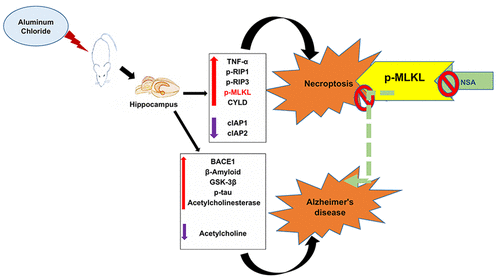当前位置:
X-MOL 学术
›
ACS Chem. Neurosci.
›
论文详情
Our official English website, www.x-mol.net, welcomes your
feedback! (Note: you will need to create a separate account there.)
Ameliorative Effect of Necrosulfonamide in a Rat Model of Alzheimer's Disease: Targeting Mixed Lineage Kinase Domain-like Protein-Mediated Necroptosis.
ACS Chemical Neuroscience ( IF 4.1 ) Pub Date : 2020-09-16 , DOI: 10.1021/acschemneuro.0c00516 Tarek M K Motawi 1 , Zeinab M Abdel-Nasser 2 , Nancy N Shahin 1
ACS Chemical Neuroscience ( IF 4.1 ) Pub Date : 2020-09-16 , DOI: 10.1021/acschemneuro.0c00516 Tarek M K Motawi 1 , Zeinab M Abdel-Nasser 2 , Nancy N Shahin 1
Affiliation

|
Alzheimer’s disease (AD) is a progressively debilitating neurodegenerative disorder that has no effective remedy, so far, with available therapeutic modalities being only symptomatic and of modest efficacy. Necroptosis is a form of controlled cell death with a recently emerging link to the pathogenesis of several neurodegenerative diseases. This study investigated the role of necroptosis in the pathogenesis of AD and evaluated the potential beneficial effect of the necroptosis inhibitor, necrosulfonamide (NSA), in a rat model of AD. AD was induced by oral administration of AlCl3 (17 mg/kg/day) for 6 consecutive weeks. Administration of NSA (1.65 mg/kg/day) intraperitoneally for 6 weeks significantly amended AlCl3-induced spatial learning and memory deficits, as demonstrated by enhanced rat performance in Morris water and Y-mazes. NSA alleviated the abnormally high hippocampal expression of tumor necrosis factor-alpha (TNF-α), β-site amyloid precursor protein cleaving enzyme 1 (BACE1), β-amyloid, glycogen synthase kinase-3β (GSK-3β), phosphorylated tau protein, and acetylcholinesterase with concordant replenishment of acetylcholine. The amendments of AD perturbations achieved by NSA correlated with its inhibitory effect on the phosphorylation of the key necroptotic executioner, mixed lineage kinase domain-like protein (MLKL). Histopathological alterations supported the biochemical findings. In conclusion, NSA treatment represents a promising anti-Alzheimer’s approach, mitigating AD neuropathologies via targeting MLKL-dependent necroptosis.
中文翻译:

坏死磺酰胺对阿尔茨海默氏病大鼠模型的改善作用:靶向混合谱系激酶域样蛋白介导的坏死病。
阿尔茨海默氏病(AD)是一种逐渐衰弱的神经退行性疾病,到目前为止,尚无有效的治疗方法,可用的治疗方式仅是对症治疗,且疗效不佳。坏死病是细胞死亡的一种控制形式,最近与几种神经退行性疾病的发病机理有关。这项研究调查了坏死病在AD发病机理中的作用,并评估了坏死病抑制剂Necrosulfonamide(NSA)在AD大鼠模型中的潜在有益作用。通过连续6周口服AlCl 3(17 mg / kg /天)诱导AD 。腹膜内给予NSA(1.65 mg / kg /天)6周,显着改善了AlCl 3引起的空间学习和记忆缺陷,如在莫里斯水和Y型迷宫中增强的大鼠表现所证明。NSA减轻了肿瘤坏死因子-α(TNF-α),β-位淀粉样前体蛋白裂解酶1(BACE1),β-淀粉样蛋白,糖原合酶激酶3β(GSK-3β)和磷酸化tau蛋白异常高表达的海马表达。 ,以及乙酰胆碱补充补充的乙酰胆碱酯酶。NSA对AD摄动的修正与其对关键坏死性死刑执行者混合谱系激酶域样蛋白(MLKL)磷酸化的抑制作用有关。组织病理学改变支持了生化发现。总之,NSA治疗代表了一种有希望的抗阿尔茨海默氏病方法,可通过靶向MLKL依赖性坏死病减轻AD神经病理学。
更新日期:2020-10-21
中文翻译:

坏死磺酰胺对阿尔茨海默氏病大鼠模型的改善作用:靶向混合谱系激酶域样蛋白介导的坏死病。
阿尔茨海默氏病(AD)是一种逐渐衰弱的神经退行性疾病,到目前为止,尚无有效的治疗方法,可用的治疗方式仅是对症治疗,且疗效不佳。坏死病是细胞死亡的一种控制形式,最近与几种神经退行性疾病的发病机理有关。这项研究调查了坏死病在AD发病机理中的作用,并评估了坏死病抑制剂Necrosulfonamide(NSA)在AD大鼠模型中的潜在有益作用。通过连续6周口服AlCl 3(17 mg / kg /天)诱导AD 。腹膜内给予NSA(1.65 mg / kg /天)6周,显着改善了AlCl 3引起的空间学习和记忆缺陷,如在莫里斯水和Y型迷宫中增强的大鼠表现所证明。NSA减轻了肿瘤坏死因子-α(TNF-α),β-位淀粉样前体蛋白裂解酶1(BACE1),β-淀粉样蛋白,糖原合酶激酶3β(GSK-3β)和磷酸化tau蛋白异常高表达的海马表达。 ,以及乙酰胆碱补充补充的乙酰胆碱酯酶。NSA对AD摄动的修正与其对关键坏死性死刑执行者混合谱系激酶域样蛋白(MLKL)磷酸化的抑制作用有关。组织病理学改变支持了生化发现。总之,NSA治疗代表了一种有希望的抗阿尔茨海默氏病方法,可通过靶向MLKL依赖性坏死病减轻AD神经病理学。











































 京公网安备 11010802027423号
京公网安备 11010802027423号